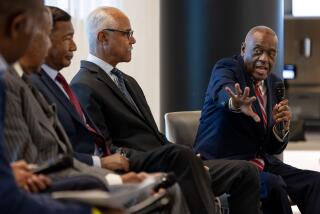Colonel Studies War to Write Its History
- Share via
RIYADH, Saudi Arabia — Looking over the shoulder of Gen. H. Norman Schwarzkopf, commander of allied forces in the Gulf War, is an army colonel who will have a large say in how history views this conflict.
The war is just a month old, but Col. Richard Swain, Ph.D., director of the Combat Studies Institute of the Command and General Staff College at Ft. Leavenworth, Kan., already is attending briefings, interviewing the major players, collecting documents and making observations on the conduct of the war.
The military, of course, is extremely interested in the lessons of its conflicts. As in past wars, the history of the Persian Gulf War will eventually be laid out in sometimes excruciating detail in a series of green books that eventually will be available from the U.S. government printing office, or at leading research libraries.
They are first and foremost military documents. But they are also prized by civilian historians as valuable, largely objective starting points.
Swain, a tall, graying, 47-year-old artillery officer, said they serve another purpose as well.
“They fulfill military accountability to the American people,” he said. “We professionals ask the American people for their sons and daughters. We lose some of them, so we better tell them how we did it.”
Swain is a military man, albeit with an interest in history that is “an obsession, a compulsion.” He earned a Ph.D. in history at Duke University in 1975 and taught the subject at West Point. He has taught, done research and written articles at the Command and General Staff College since 1985.
“Being a historian isn’t the kind of thing the army rewards,” he acknowledged in an interview. “You have to be prepared for that. I didn’t get to be a colonel by being a historian. I got to be a colonel in field artillery, then went into history.”
Swain served two tours in Vietnam before turning to history and teaching. His return to the battlefield “forces me back into reality.”
Twenty-nine people, including Swain, his three assistants and three members of the 44th Military History Detachment are directly involved in collecting information for the Army’s Persian Gulf history.
The colonel attends morning command briefings and staff meetings in the afternoon. He reads the war plans. He talks to officers and goes over their files, following the war’s paper trail.
At the beginning of March, Swain will begin to compile his first command report, covering the period from last August, when Iraq invaded Kuwait, until midnight Jan. 16, the eve of the first allied bombing attacks on Iraq. A similar report will be prepared on the Desert Storm phase now under way.
Part of the job will entail evaluating the decisions made by Schwarzkopf and his commanders, a sometimes daunting task.
“What I always tell my students is that decisions are always a choice between difficulties. Part of the job is when you have a bad decision, you have to find out how it got that way,” he said.

